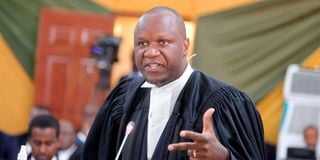Premium
Petitioners take issue with IEBC conduct in presidential election

Lawyer Willis Otieno who is representing activist Khelef Khalifa and others in the presidential election petition.
A group of 11 petitioners who have challenged the declaration of Deputy President William Ruto as President-elect yesterday told the Supreme Court there was widespread and deliberate non-compliance to the Constitution and electoral laws, which calls for cancellation of the entire process.
Activist Khelef Khalifa, through lawyer Willis Otieno, said compliance to the Constitutional provisions on holding elections is key to ensuring the expression of the sovereign will and power of the people by way of the ballot.
In his submissions before the seven judges of the Supreme Court, Mr Otieno argued that all the commissioners of the electoral body should have been involved in the tallying and verification of votes for the presidential election.
Contradicted himself
Mr Otieno further said that Independent Electoral and Boundaries Commission (IEBC) chairman Wafula Chebukati contradicted himself by first claiming that he is solely responsible for tallying and verification of the presidential election, but later changed and claimed that the process was handled by all the commissioners.
The lawyer cited past court decisions, including the 2017 Supreme Court judgment that nullified the presidential election, to support his argument, stating that the mandate to tally and verify results cannot be vested on one individual. He said IEBC went into the election with a compromised voter register because there was no time to clear duplication of voters from its systems.
Taken action against Chebukati
He urged the court to make recommendations for action to be taken against Mr Chebukati, saying, Kenyans cannot be subjected to anxiety during every General Election because of acts of people who are not ready to follow the law.
“We can’t be coming to you every election with the same problem involving the same people. That’s why we are calling for criminal sanctions [against Mr Chebukati],” he said.
Senior Counsel Zehrabanu Janmohammed, who was leading petitioner John Njoroge Kamau’s legal team, said he was unhappy with being referred to as a surrogate or proxy of Mr Odinga.
According to her, all he was doing was to exercise his constitutional duty and following the law.
Split between IEBC bosses
His first grievance was the split between IEBC bosses following the declaration of the presidential election results.
She stated that, if the framers of the Constitution had intended that tallying and verification of presidential votes be done by the IEBC chairperson, then they could have said it expressly.
She wondered why Kenyans would need to pay seven commissioners if the chairperson was to hold all the power in the electoral process. She further questioned why the country would spend Sh30 billion on an election only for IEBC to bungle it.
“My biggest problem with IEBC is that, for five years, they did nothing. The Supreme Court had given directions in 2017 on what IEBC should do but it did nothing. The same mistake they did in 2017 has been repeated,” the lawyer said.
Returning officer
Mr Paul Nyamodi for Youth Advocacy Africa refuted Mr Chebukati’s assertion that he is the returning officer of the presidential election. Such a position, he said, does not exist in law, but is the creation of the IEBC chairman to further an underhanded scheme.
The lawyer, who represented IEBC in 2017, said the agency created the position and outlined its roles through a Kenya Gazette notice, allowing Mr Chebukati to tally and verify presidential election results in contravention of the Constitution.
“It is again important to ask the question: Where were the other commissioners when the chairman was tallying and verifying results?” Mr Nyamodi posed.
He said Mr Chebukati tasked IEBC Vice-Chairperson Juliana Cherera with leading the media and communications centre, assisted by Commissioner Boya Molu, through an internal memo.
The second memo was to Commissioners Francis Wanderi and Irene Masit, ordering them to lead the logistics (welfare and security) for the tallying centre.
“Those are two commissioners, none has been appointed to tally and verify,” Mr Nyamodi said.
Commissioner Justus Nyang’aya was told to look after dignitaries and VIPs. The last letter was to Commissioner Abdi Guliye and CEO Hussein Marjan, asking them to help Mr Chebukati in tallying and verifying the presidential votes.
Mr Nyamodi pointed out that Mr Marjan was illegally given the work of a commissioner.
No deputy
“Returning officers are gazetted with deputies. The IEBC chairman appointed himself with no deputy. The deployment of commissioners at Bomas was not accidental. The chairman has dealt with election timelines as though they are elastic,” Mr Nyamodi said.
Lawyer Willy Mituga, who represented Mr David Kariuki Ngari, said the four breakaway commissioners admitted that the presidential election results were solely the work of Mr Chebukati.
Mr Mituga dismissed Prof Yakub Guliye’s claim that the failure to declare the results from 27 constituencies on account of violence at the national tallying centre at the Bomas of Kenya cannot stand because peace was eventually restored and Mr Chebukati was able to declare a president-elect.
Verification by commission
The lawyer said the votes have to be placed before the entire commission for verification before the final result is declared.
“In the 27 constituencies, there was lack of transparency,” he said.
Mr Kibe Mungai, representing Ms Juliah Nyokabi Chege, said IEBC should have made special arrangements to aid hospitalised people and other disadvantaged groups to vote.
Mr Mungai argued that there was discrimination because some groups were catered for, citing prisoners and people in the diaspora, while the elderly and the sick people were not given priority in polling stations.
“If those people (disadvantaged people like the hospitalised and some living with disability) had voted, the results could have been affected,” he said.
Mr Mungai claims that Mr Chebukati was not remorseful when his clients questioned why IEBC did not ensure that disadvantaged groups were catered for to ensure that the highest possible number of Kenyans voted.






